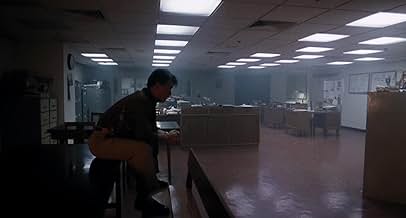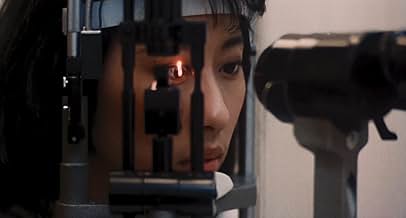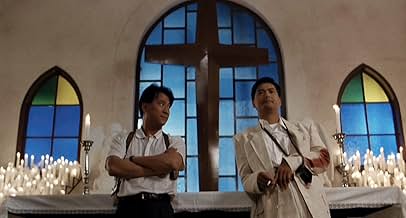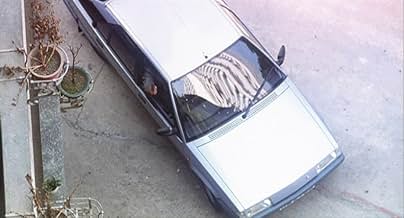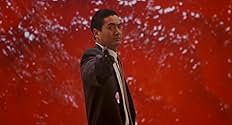IMDb रेटिंग
7.7/10
53 हज़ार
आपकी रेटिंग
एक मोहभंग हत्यारा एक गायक को दृष्टि बहाल करने के लिए अपनी कमाई का उपयोग करने की उम्मीद में एक आखिरी हिट स्वीकार करता है जिसे उसने गलती से अंधा कर दिया था।एक मोहभंग हत्यारा एक गायक को दृष्टि बहाल करने के लिए अपनी कमाई का उपयोग करने की उम्मीद में एक आखिरी हिट स्वीकार करता है जिसे उसने गलती से अंधा कर दिया था।एक मोहभंग हत्यारा एक गायक को दृष्टि बहाल करने के लिए अपनी कमाई का उपयोग करने की उम्मीद में एक आखिरी हिट स्वीकार करता है जिसे उसने गलती से अंधा कर दिया था।
- पुरस्कार
- 2 जीत और कुल 6 नामांकन
Chow Yun-Fat
- Ah Jong
- (as Chow Yun Fat)
Kong Chu
- Sydney Fung
- (as Chu Kong)
- …
Kenneth Tsang
- Sgt. Tsang Yeh
- (as Tsang Kong)
- …
Shing Fui-On
- Wong Hoi
- (as Shing Fui On)
Ricky Chun-Tong Wong
- Frankie Fung
- (as Fan Wei Yee)
Chuen Chiang
- Shooter at beach
- (बिना क्रेडिट के)
Chin-Hung Fan
- Shooter at beach
- (बिना क्रेडिट के)
Woon-Ling Hau
- Trash lady
- (बिना क्रेडिट के)
फ़ीचर्ड समीक्षाएं
John Woo's "The Killer" shows a master at the height of his powers. Woo, today working in the United States, gained fame in Hong Kong through the two "Better Tomorrow" films. He became popular and used his success to go to greater things. In fact, much of Woo's HK work is similar, including the work he did in the early 90's like "Bullet in the Head" and "Hard Boiled". But "The Killer" shows John Woo as a perfectionist, the top director of action films who can perfectly blend in over-the-top violence with emotional drama.
"The Killer" follows John (Jeff in other versions of the film), who's played to utter perfection by Chow Yun Fat. John is a hit-man planning retirement. On one job, however, he accidentally shoots a singer (Jenny) near her eyes. She survives, but her vision is blurry. John saves her from a gang of rapist thieves, and the two ultimately fall in love with each other, despite Jenny never having seen John's face. On John's case, however, is Inspector Li, hard at work, who is intent on always getting his man. Much of the movie involves John and the results of his final job which ultimately pits him up against the entire mob, who want him dead for overexposing his identity. And the rest of the film follows John catering to Jenny's needs and helping her at every moment, all the while evading Li, who's getting closer and closer to stopping him.
To make the movie the memorable film that it is, Woo perfectly orchestrates some of the best shoot-outs ever seen on film. Much of what Woo did here, he was never able to follow up. "Hard Boiled" was interesting, but its final shoot-out, over 20 minutes in length, just couldn't keep up. It got boring by the end. What Woo does in "The Killer" is give you a sample of his powers and then leave you begging for more. And that what you'll be literally doing: begging for just a glimpse of the next dude victim to Fat's two beautiful handguns.
It's only sad to see that, not so much Woo doesn't do these films anymore, but that Woo rarely does good films now.(Period) He's too busy, working on ego with top stars and killer budgets. His two films that came as far as making an impact with me from his U.S. catalog will probably include "Broken Arrow" and "Face/Off", both primarily due to just how much I like Travolta (though the former was also an early film of mine that I really remember liking, since it was different from all the Disney and kid stuff I was used to). But Woo, intent on fulfilling his dreams of making a musical and captivating audiences with his powerful style, can just show the people a screening of this film. It's quoted as being "Violence as poetry", and that's exactly what it is. With the beautiful music adding feeling and depth to the characters and the great writing and direction, this is easily Woo's tour-de-force.
9.5/10 (****/****)
"The Killer" follows John (Jeff in other versions of the film), who's played to utter perfection by Chow Yun Fat. John is a hit-man planning retirement. On one job, however, he accidentally shoots a singer (Jenny) near her eyes. She survives, but her vision is blurry. John saves her from a gang of rapist thieves, and the two ultimately fall in love with each other, despite Jenny never having seen John's face. On John's case, however, is Inspector Li, hard at work, who is intent on always getting his man. Much of the movie involves John and the results of his final job which ultimately pits him up against the entire mob, who want him dead for overexposing his identity. And the rest of the film follows John catering to Jenny's needs and helping her at every moment, all the while evading Li, who's getting closer and closer to stopping him.
To make the movie the memorable film that it is, Woo perfectly orchestrates some of the best shoot-outs ever seen on film. Much of what Woo did here, he was never able to follow up. "Hard Boiled" was interesting, but its final shoot-out, over 20 minutes in length, just couldn't keep up. It got boring by the end. What Woo does in "The Killer" is give you a sample of his powers and then leave you begging for more. And that what you'll be literally doing: begging for just a glimpse of the next dude victim to Fat's two beautiful handguns.
It's only sad to see that, not so much Woo doesn't do these films anymore, but that Woo rarely does good films now.(Period) He's too busy, working on ego with top stars and killer budgets. His two films that came as far as making an impact with me from his U.S. catalog will probably include "Broken Arrow" and "Face/Off", both primarily due to just how much I like Travolta (though the former was also an early film of mine that I really remember liking, since it was different from all the Disney and kid stuff I was used to). But Woo, intent on fulfilling his dreams of making a musical and captivating audiences with his powerful style, can just show the people a screening of this film. It's quoted as being "Violence as poetry", and that's exactly what it is. With the beautiful music adding feeling and depth to the characters and the great writing and direction, this is easily Woo's tour-de-force.
9.5/10 (****/****)
"Heroic bloodshed" and "gun fu" were sub-genres coined by John Woo during the mid-80s, starting with A Better Tomorrow. This was a film that marked Woo as a rising artist within Hong Kong cinema of the modern age. After making a sequel to A Better Tomorrow, Woo went and directed The Killer, followed by Bullet in the Head and Hard-Boiled, these films proved his talent as a director who was able to illustrate ultra-violence, through what closely resembled ballet (a.k.a. in this sense, a dance of death). These outrageously stylised methods of film-making hastily became noted by Hollywood producers and Woo via a mistake on his behalf- decided to make his move to the place where financing was merely an accessory. Ever since this move, Woo has crafted numerous well-known works of commercial success, but critical failure (unlike his earlier pictures), including the likes of Broken Arrow, Face/Off, Mission Impossible 2 and Windtalkers. Shame, considering these lacked everything that his trademark works created, but can be expected with the restrictions Hollywood producers commonly put in place. Fortunately, his '80s legacy lives on and still has an acute influence on many mainstream directors of today.
The Killer propelled Woo's career, as well as that of Chow Yun-Fat, who took the title role of Ah Jong. Although, he plays an assassin, he is the kind who is out to get "the bad guys", and follows a strict code of honour and ethics. Compassionate, sympathetic and remorseful of the way in which he leads his life, Ah Jong begins to become more cynical of the brutality he savours. After accidentally blinding an innocent singer (who he later falls in love with) during a gunfight, Ah Jong's remorse overwhelms him to such a degree that he becomes determined to get a vital donor that could potentially save her eyesight. In order to finance this, Ah Jong settles a final hit, which soon spirals out of control. Law enforcement inevitably becomes aware of the destruction wreaking its way throughout Hong Kong because of the triads. Nonetheless, the cop on the case happens to be understanding of Ah Jong, and as both relate to each other they start to unexpectedly develop an unexpected partnership.
In 1992, Quentin Tarantino's Reservoir Dogs was released; now, it should be noted that the white suits used in The Killer admittedly inspired those now-infamous black suits. I bring this up because I wish to present one of the main techniques utilised in Woo's 1989, action classic. Such a procedure is contrasting the lashings of blood (shown during the countless fight scenes) against the calm, white clothing. Waving a white cloth, for example, is a sign of retreat, or peace and placing blood on white is an opposing confliction. Transcending everything that most action films can only dream of, The Killer combines a compulsory fusion of intelligence and entertainment. Then there is the paradox (as such) of both the cop and the killer using guns, but for differing reasons. Essentially, both are committing the same acts, through similar methods, but for different reasons. The two men have a certain confidence and an explicit willingness to seek fulfilment and justice, which enables a parable to be crafted between the two individuals.
Edited with a glaring visual stance, filmed through bright colour filters and following bare-knuckled narrative management, The Killer packs a well-placed gut-punch. Engaging the viewer through ultra-cool protagonists and beautifully choreographed fight scenes, this grand, wry take on the idealistic assumption of decency within the world of organised crime remains a work of bloodshed which holds artistic significance. Even with the overly dramatised screenplay (echoing a consistent waft of unsuited, moralistic sentimentality) and the dated '80s soundtrack, the piece is an extravagant and exciting take on a temperamental genre. Containing metaphors (the doves extinguishing the flames on a collection of candles) and the use of a church for a set-piece, the film is vastly unique for what is adrenaline-based action. Saying that, most directors would opt for endless cuts as a means of groping the viewer's attention, Woo on-the-other-hand avoids such an amateurish technique, choosing a cultivated approach. The finished result is a concoction of mind-boggling stand-offs and humanistic undertones, enabling it to become a motivating take on a seemingly predictable genre and an ode to the classic westerns (who said The Wild Bunch?). Remember, Chow Yun-Fat is for action, what John Wayne was for the western.
The Killer propelled Woo's career, as well as that of Chow Yun-Fat, who took the title role of Ah Jong. Although, he plays an assassin, he is the kind who is out to get "the bad guys", and follows a strict code of honour and ethics. Compassionate, sympathetic and remorseful of the way in which he leads his life, Ah Jong begins to become more cynical of the brutality he savours. After accidentally blinding an innocent singer (who he later falls in love with) during a gunfight, Ah Jong's remorse overwhelms him to such a degree that he becomes determined to get a vital donor that could potentially save her eyesight. In order to finance this, Ah Jong settles a final hit, which soon spirals out of control. Law enforcement inevitably becomes aware of the destruction wreaking its way throughout Hong Kong because of the triads. Nonetheless, the cop on the case happens to be understanding of Ah Jong, and as both relate to each other they start to unexpectedly develop an unexpected partnership.
In 1992, Quentin Tarantino's Reservoir Dogs was released; now, it should be noted that the white suits used in The Killer admittedly inspired those now-infamous black suits. I bring this up because I wish to present one of the main techniques utilised in Woo's 1989, action classic. Such a procedure is contrasting the lashings of blood (shown during the countless fight scenes) against the calm, white clothing. Waving a white cloth, for example, is a sign of retreat, or peace and placing blood on white is an opposing confliction. Transcending everything that most action films can only dream of, The Killer combines a compulsory fusion of intelligence and entertainment. Then there is the paradox (as such) of both the cop and the killer using guns, but for differing reasons. Essentially, both are committing the same acts, through similar methods, but for different reasons. The two men have a certain confidence and an explicit willingness to seek fulfilment and justice, which enables a parable to be crafted between the two individuals.
Edited with a glaring visual stance, filmed through bright colour filters and following bare-knuckled narrative management, The Killer packs a well-placed gut-punch. Engaging the viewer through ultra-cool protagonists and beautifully choreographed fight scenes, this grand, wry take on the idealistic assumption of decency within the world of organised crime remains a work of bloodshed which holds artistic significance. Even with the overly dramatised screenplay (echoing a consistent waft of unsuited, moralistic sentimentality) and the dated '80s soundtrack, the piece is an extravagant and exciting take on a temperamental genre. Containing metaphors (the doves extinguishing the flames on a collection of candles) and the use of a church for a set-piece, the film is vastly unique for what is adrenaline-based action. Saying that, most directors would opt for endless cuts as a means of groping the viewer's attention, Woo on-the-other-hand avoids such an amateurish technique, choosing a cultivated approach. The finished result is a concoction of mind-boggling stand-offs and humanistic undertones, enabling it to become a motivating take on a seemingly predictable genre and an ode to the classic westerns (who said The Wild Bunch?). Remember, Chow Yun-Fat is for action, what John Wayne was for the western.
10Anardil
Before seeing a genuine Hong-Kong produced John Woo movie, I thought I knew what action was, and what the action-movie genre was capable of. I was wrong. The Killer was the single most impressive, awe-inspiring, jaw-dropping action movie I had seen in years, and is now one of my favourite movies of any genre. It is #2 on my all-time list.
Why? First of all, the well-known poetic violence of the super-charged action scenes make for a tremendously exciting film. These combine choreographed bloodshed (there is an almost constant stream of bullets) with raw emotion that puts even the best Hollywood actioners to shame. Look at Hollywood action movies today; almost all Hollywood action is inspired (not to mention plagiarised) from the "heroic bloodshed films," the best of which is The Killer.
Quentin Tarantino and Robert Rodriguez are only the most obvious examples of American directors to put Woo's trademark stylized violence to use, and neither handle it as well as Woo.
But beyond this, the characters and the story are what drive this movie and what truly set it apart. The story of the relentless cop and the vicious killer is only the latest in a long line of detective stories, starting with Arthur Conan Doyle and Edgar Allan Poe in the 19th century, and continuing in every cop show on TV today. The hero and the villain are practically the same; they are only divided by an almost arbitrary line called the law. In The Killer, both "Mickey Mouse" and "Dumbo" are unrelenting, capable, though misunderstood, professionals. Their motivations differ, but they both have the killer instinct. The classic storyline of the interaction of the two characters who eventually realize their similarities and end up working together has been seen before, but never has it been used to such effect as in The Killer.
Woo's familiar themes of brotherhood, betrayal and loyalty also reach their cinematic peak in this movie. The viewer not only wants to see the next pyrotechnic action scene, but is actually concerned with the lives of the characters, an element that is almost always lacking in typical Hollywood fare.
Finally, the gun-battle scenes, when they come, are simply the most spectacular, mind-blowingly violent, yet strangely beautiful, action scenes ever imagined or filmed. And last but not least, is the unbelievably powerful screen presence of Chow Yun-Fat, as always cool incarnate. His effortless lead and the tension created by his playing off of co-star Danny Lee make The Killer as close as I have yet seen to the perfect action movie. I recommend it to any hard-core action fan and also suggest Hard-Boiled, though Woo's American efforts thus far have not been up to his Hong Kong works.
Rating: 10
Why? First of all, the well-known poetic violence of the super-charged action scenes make for a tremendously exciting film. These combine choreographed bloodshed (there is an almost constant stream of bullets) with raw emotion that puts even the best Hollywood actioners to shame. Look at Hollywood action movies today; almost all Hollywood action is inspired (not to mention plagiarised) from the "heroic bloodshed films," the best of which is The Killer.
Quentin Tarantino and Robert Rodriguez are only the most obvious examples of American directors to put Woo's trademark stylized violence to use, and neither handle it as well as Woo.
But beyond this, the characters and the story are what drive this movie and what truly set it apart. The story of the relentless cop and the vicious killer is only the latest in a long line of detective stories, starting with Arthur Conan Doyle and Edgar Allan Poe in the 19th century, and continuing in every cop show on TV today. The hero and the villain are practically the same; they are only divided by an almost arbitrary line called the law. In The Killer, both "Mickey Mouse" and "Dumbo" are unrelenting, capable, though misunderstood, professionals. Their motivations differ, but they both have the killer instinct. The classic storyline of the interaction of the two characters who eventually realize their similarities and end up working together has been seen before, but never has it been used to such effect as in The Killer.
Woo's familiar themes of brotherhood, betrayal and loyalty also reach their cinematic peak in this movie. The viewer not only wants to see the next pyrotechnic action scene, but is actually concerned with the lives of the characters, an element that is almost always lacking in typical Hollywood fare.
Finally, the gun-battle scenes, when they come, are simply the most spectacular, mind-blowingly violent, yet strangely beautiful, action scenes ever imagined or filmed. And last but not least, is the unbelievably powerful screen presence of Chow Yun-Fat, as always cool incarnate. His effortless lead and the tension created by his playing off of co-star Danny Lee make The Killer as close as I have yet seen to the perfect action movie. I recommend it to any hard-core action fan and also suggest Hard-Boiled, though Woo's American efforts thus far have not been up to his Hong Kong works.
Rating: 10
Of all John Woo's bullet-ridden action movies, this is his greatest. You see many of Mr. Woo's "trademarks" (flying doves, reflections in mirrors, very strong Catholic symbolism) that appear in his inferior American directed films (save Face Off) first in this Hong Kong cinema classic. Sure the violence is over the top, the plot only adequate, the sentimentalism a little thick. The actions scenes are filmed with such, I dare say beauty, that no Hollywood 'by the numbers' action film can possibly compete. While this film is not for the squeamish or those offended by excessive and rather graphic violence, if you are in any way a fan of action films - you mush see this movie (and many other John Woo directed films during his Hong Kong days, i.e. Hardboiled, A Better Tomorrow, etc).
Chow Yun Fat and John Woo strike again. The Killer is not your run of the mill action flick. It features characters you care about, jaw-dropping action sequences, and , best of all, Chow Yun Fat. He's always supercool. Chow and co-star Danny Lee play very similar characters but are on opposite sides of the law. It makes the film work very well. The heroes can relate to one another because they have both injured the innocent while doing their jobs. Another great actor in the film is Kong Chu in the role of Sydney, the one handed hitman. Being in the middle of the fray, he makes for an interesting character. There is a great scene involving Sydney's betrayal. Chow is so amazing with his emotions in this scene. He's not just an international action superstar, he's an underrated and incredible actor as well. That's what makes The Killer more than just another action movie. Woo's direction always helps too. The Killer boasts one of the best and most epic shootouts in film history. Woo's older films are as stylistic as they get, I mean stylistic as hell. Chow Yun Fat and John Woo make an incredible duo. Nicholas Cage is no replacement, it's high time they work together again.
क्या आपको पता है
- ट्रिवियाJohn Woo dedicated this film to Martin Scorsese.
- गूफ़The road sign board pointing to the hospital says "SCARED HEART HOSPITAL".
- इसके अलावा अन्य वर्जनThe Taiwan version has a scene where it shows Jenny sitting in her dressing room while hearing the gunshots around 5 minutes into the movie.
- कनेक्शनFeatured in Century of Cinema: Naamsaang-neuiseung (1996)
टॉप पसंद
रेटिंग देने के लिए साइन-इन करें और वैयक्तिकृत सुझावों के लिए वॉचलिस्ट करें
विवरण
बॉक्स ऑफ़िस
- दुनिया भर में सकल
- $23,40,425
- चलने की अवधि1 घंटा 51 मिनट
- रंग
- पक्ष अनुपात
- 1.85 : 1
इस पेज में योगदान दें
किसी बदलाव का सुझाव दें या अनुपलब्ध कॉन्टेंट जोड़ें


